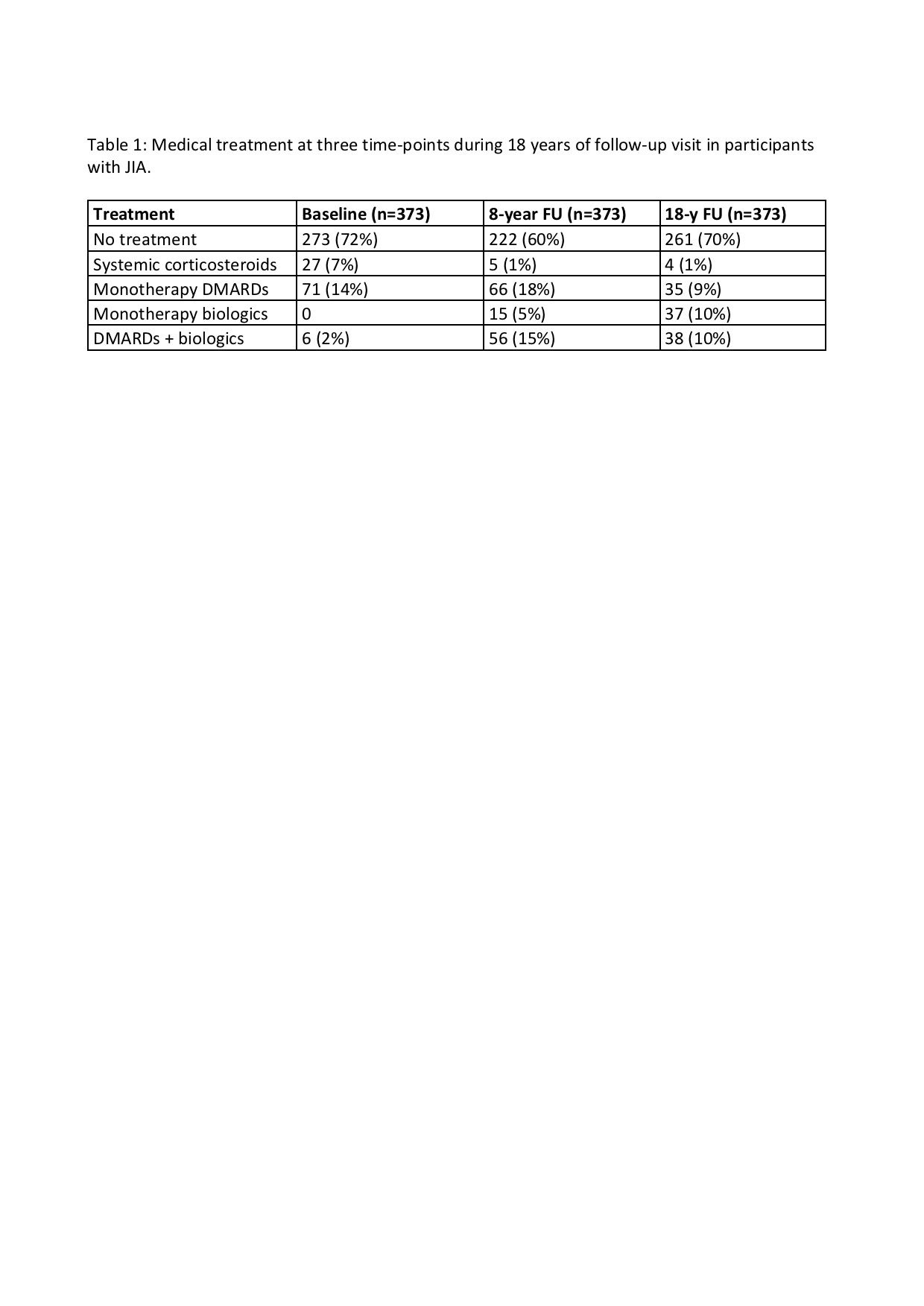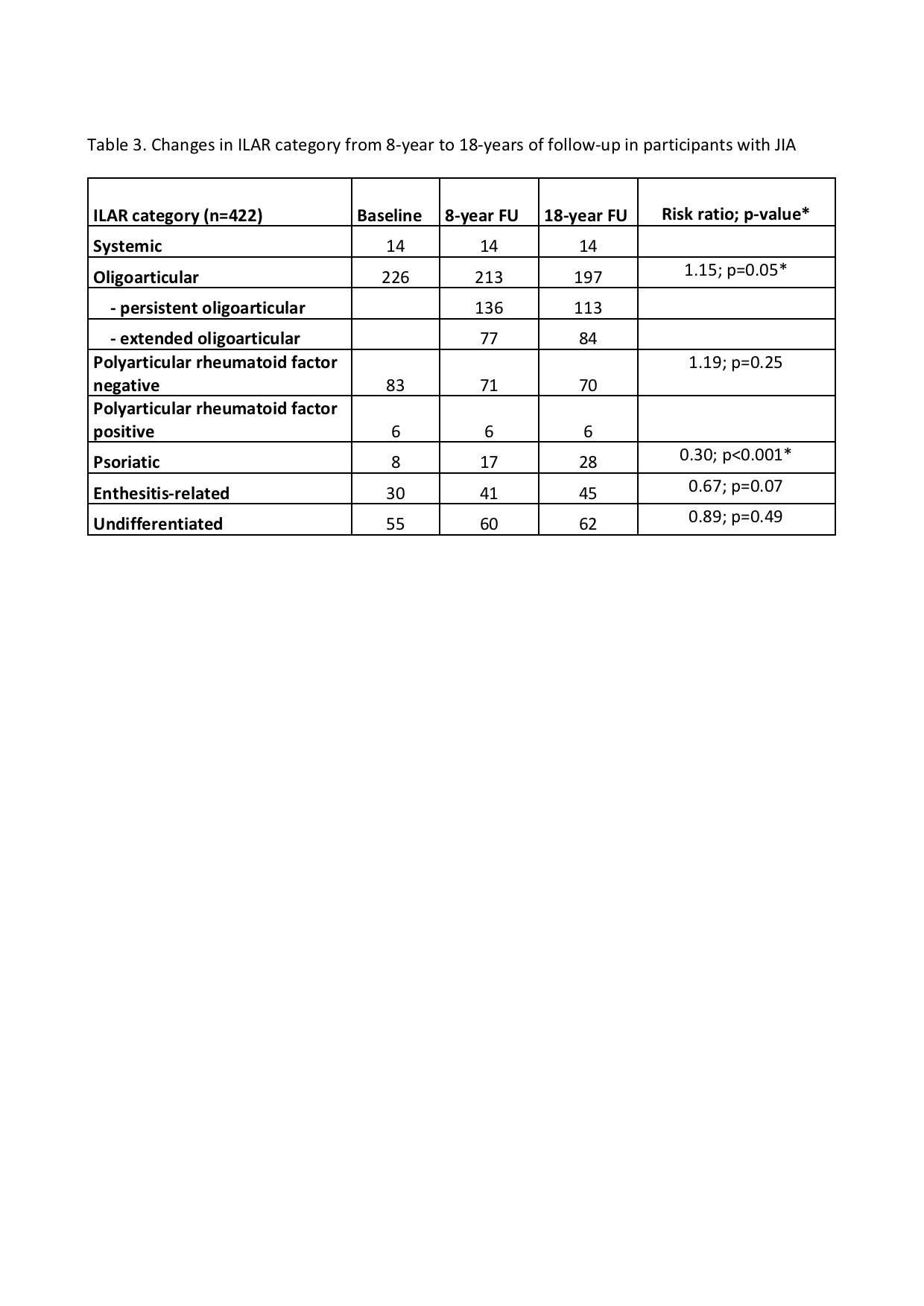Session Information
The 2020 Pediatric Rheumatology Symposium, originally scheduled for April 29 – May 2, was postponed due to COVID-19; therefore, abstracts were not presented as scheduled.
Date: Saturday, May 2, 2020
Title: Poster Session 3
Session Type: ACR Abstract Session
Session Time: 4:15PM-5:15PM
Background/Purpose: Previously, we showed that ILAR JIA categories defined at disease onset change considerably during the first 8 years of disease course. Whether achieved remission and defined ILAR categories are sustainable further into adulthood remains unknown. The aim of this study was to describe the trajectory of JIA disease course over time by comparing treatment, disease activity and ILAR categories from baseline, 8 and 18 years of disease.
Methods: Included were 510 consecutive cases of JIA with disease onset during 1997-2000 from Denmark, Norway, Sweden and Finland in a longitudinal, population-based 18-year (mean age 17.5 ± 1.7 years) follow-up study. Clinical data was collected consecutively at baseline, 8 and 18 years of disease, and evaluated regarding treatment, disease activity and ILAR category. Descriptive statistics (mean and standard deviation, SD) were used to assess clinical characteristics and chi-squared test to compare categorical data.
Results: Altogether, 434 (85%) were eligible for inclusion by having at least two follow-up visits during the disease course. At the 18-year follow-up 329 (76%) attended a clinical visit, and 105 (24%) completed a standardized telephone interview. Mean age at last follow-up was 24.0 ± 4.4 years (mean ± SD); 68% females. At the 8-year follow-up, 60% were without systemic treatment, which increased significantly to 70% 10 years later at the 18-year follow-up (Risk ratio 1.3; p=0.03) (Table 1). Out of 178 participants not being in remission at 8-year follow-up, 115 (65%) were still not in remission after 18 years (risk ratio 1.5; p< 0.001) (Table 2). Additionally, out of 151 being in remission off medication 8 years after disease onset, 103 (68%) were still in remission off medication at 18-year follow-up. The distribution of ILAR categories continued to change throughout the study period (Table 3). In total, 44 patients (10%) changed ILAR category between baseline and 8 years of follow-up. Further, 56 (13%) changed category between the 8 and 18-year follow-up. There was a significant increase in the psoriatic arthritis category from 8 at baseline to 28 at 18-year follow-up (p< 0.001) and a significant decrease in the oligoarticular category (p=0.05) compared to baseline.
Conclusion: In this long-term prospective study in a population-based setting, significantly more patients were off medication after 18-years of follow-up compared to medicines use 8 years after onset, but the number of patients in remission had not increased. The ILAR categories defined after 8 years were not sustainable but changed significantly even beyond 8 years after onset.
To cite this abstract in AMA style:
Glerup M, Arnstad E, Rypdal V, Peltoniemi S, Aalto K, Rygg M, Nielsen S, Fasth A, Berntson L, Nordal E, Herlin T. Ongoing Disease Activity in Juvenile Idiopathic Arthritis (JIA) 18 Years After Disease Onset: A Population-based Nordic Study [abstract]. Arthritis Rheumatol. 2020; 72 (suppl 4). https://acrabstracts.org/abstract/ongoing-disease-activity-in-juvenile-idiopathic-arthritis-jia-18-years-after-disease-onset-a-population-based-nordic-study/. Accessed .« Back to 2020 Pediatric Rheumatology Symposium
ACR Meeting Abstracts - https://acrabstracts.org/abstract/ongoing-disease-activity-in-juvenile-idiopathic-arthritis-jia-18-years-after-disease-onset-a-population-based-nordic-study/



